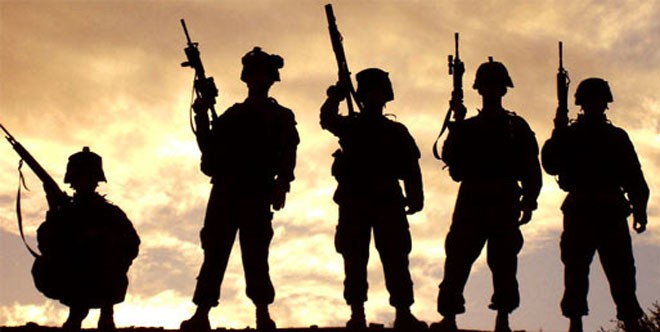

Heroism is exemplary bravery while valiance is determined courage. A soldier who undertakes to bear arms on behalf of society and, where needed, lay down his life protecting its interests, is thus accepted in most cultures as the ultimate manifestation of a hero.
On the face of it, there can’t be a higher calling, a greater sacrifice than to accept a strict regimen that keeps you in a state of unnatural alert on behalf of others and deprives you of normal freedoms so that others can enjoy them by lowering their guards and go to sleep without fear that their life will be shortened artificially.
But the question is, if you’re paid and trained to face danger, is it heroism in the first place even if you carry out orders? This, especially, when you sign up as a soldier on the condition that you will not hesitate to die when required -- or to kill others when ordered -- and that you’ll be trained to survive and to prevent the country’s enemy soldiers from surviving. In exchange, you get proportionate benefits in the shape of free or concessionary housing, insurance, education, and other emoluments, including pension and other benefits for your family.
After all, if civilians who choose to overcome a range of threatening adversities for both others and themselves, including even embracing death when occasion demands, such as brave student Aitezaz Hussain did, without any upfront contract for material and other benefits for either themselves or their families -- they are heroes, too.
As are the 40,000 ordinary citizens who died in Pakistan since 9/11, becoming victims to policies and their impacts they were not part of.
Even if soldiers and generals provided for and paid to be brave are heroes, the question is how are civilians lesser mortals or lesser heroes for being so without contracts and in spite of paying the army to protect them?
The question is when the citizens surrender the right to violence to the state and sanction it monopoly over use of force against their adversaries and antagonists, and the results still don’t guarantee safety, what does that makes the citizens? Merely victims, or heroes, for suffering double jeopardy?
Unlike citizens, who by right or responsibility bear no TORs for being brave or being required to demonstrate heroism, militaries and armies have precisely this mandate. And what better litmus test for passing this grade than conducting war(s) when required and winning them provided their adversaries are not overtly disproportionately superior.
Pakistan’s historical context provides for glorious victories by its military both in terms of inter-state and intra-state wars and battles -- but, according to many a detractor, mostly in textbooks and we know who pens histories. The net result of three wars with India: a massive territorial and population loss, however political the issue. The result of an aggressive pursuit of influence in Afghanistan: a massive terrorism problem that not only turned the concept of strategic depth on its head but also resulted in tens of thousands more of the country’s citizens killed than any Afghans or Indians that may have been taken out. An oversimplification? Sure, but doesn’t change the bottom lines.
Despite not being a people’s liberation army like, for example, the Chinese military, the Pakistan army and the other branches of the military, have retained the image of national heroes. This primarily because the army has ruled the country for half its life and this prevalence over the national polity has made it easier to paint itself as a saviour force. Hence, the emphasis on ‘saving’ the country in each of the martial law proclamations.
The fact that bouts of military rule have been as inept, if not worse, as representative democratic dispensations in terms of governance is an underappreciated contribution to the confusion of whether we treat our army as a saviour and hero army when many see it employ religion, nationalism, and politics to assert its higher mission of defending the country’s borders. Musharraf, the army chief, had gallantly said the "army needs to stay in [power] to stay out." There never was a need to overdo the ‘hero’ card -- the status was for the taking by merely being a professional rather than a missionary army.
And yet it would be a fallacy of the high order to think the military in Pakistan is neither a hero nor brave enough, despite the hearty budgets that people arrange for it every year to keep that status without working for it each year. Look at what happened to Iraq when its military was disbanded, or how the absence of one has affected Afghanistan (although it is making amends and progress now), or Libya, to some extent.
Pakistan would Balkanise -- with a frenzy and speed and impact greater than the Balkans themselves -- if the Pakistan army were not around and not strong. Until the country doesn’t disintegrate further or the Taliban take over Qila Balahisar in Peshawar, the reserve position and status for Pakistan army and its brave soldiers and generals will still be those of heroes. We may not necessarily need a hero army but we definitely need an army. Now that’s heroic.